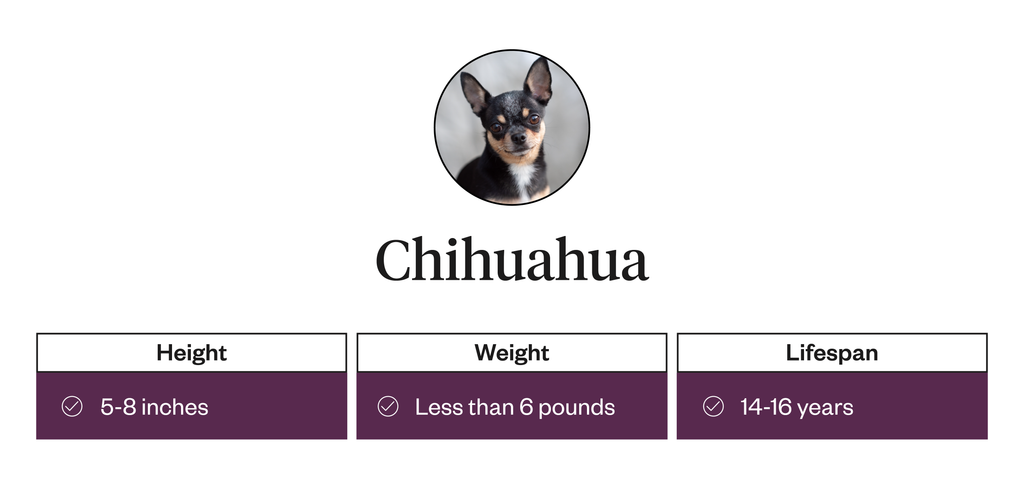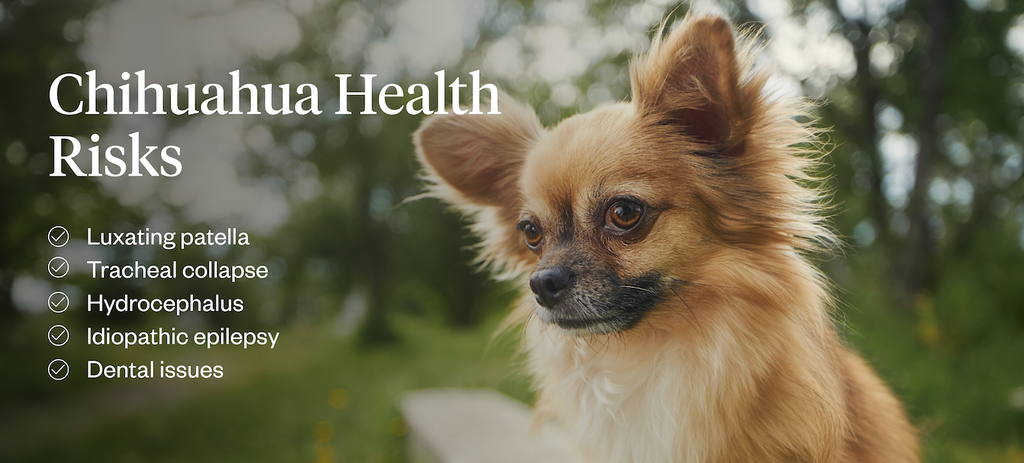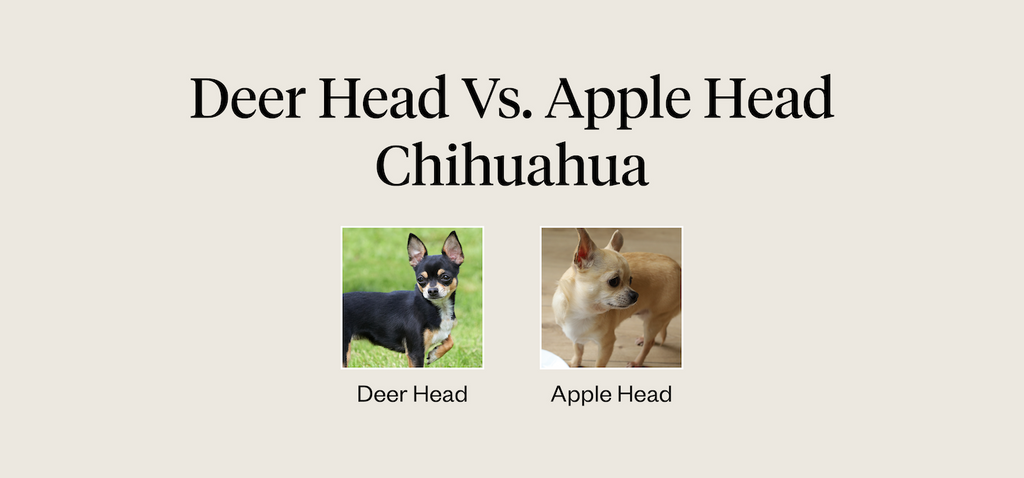8 Min Read
Chihuahua: Pet Profile
Key takeaway
Renowned for their small size, Cihuahuas pack a big personality. Characterized by their spirited and loyal nature, these petite pups are known for forming strong bonds with their pet parents and playful alert personalities.

Why pet owners are switching to online vet care with Dutch
-
Prescriptions delivered free to you
-
Fast access to Licensed Vets over video
-
Unlimited video visits and follow-ups
Chihuahuas have petite frames but larger-than-life personalities. A unique blend of charm and tenacity, they're known for their boundless energy and distinctive personalities.
Often mistaken for a lap dog, there's more to this breed than meets the eye. Their loyal, alert, and sometimes feisty demeanor make them excellent companions for those who prefer toy breeds.
With origins tracing back to ancient Mexico, they carry a rich history. Keep reading to learn more about Chihuahuas to decide if this breed is right for you.
- History & Origin Of Chihuahuas
- Physical Attributes Of Chihuahuas
- Behavioral Characteristics Of Chihuahuas
- Chihuahua Health Risks
- Caring For A Chihuahua
- FAQs
- Final Notes
History & Origin Of Chihuahuas
The Chihuahua dog is the smallest of the AKC-registered breeds but perhaps has one of the biggest personalities.1 The true origins of this toy dog are unknown. Experts believe they hailed from Mexico, specifically the Aztecs and Toltecs, while others believe this breed was brought from the island of Malta.1
That said, their ancestry dates back to the Aztecs. When Aztec nobility would die, the tradition was to bury or cremate the dog with them, believing that the spirit of the Chihuahua would guide them through the afterlife.1
It wasn't until the 1800s that people in the US began to take an interest in the breed and started importing Chihuahuas.1 These first initial dogs primarily had long coats, making people believe they were bred from papillons and other toy breeds with longer coats like Pomeranians. However, the long coat was discovered to be a variation of the Chihuahua.1
Physical Attributes Of Chihuahuas

Similar to the Brussels Griffon, the Chihuahua is a toy breed most known for its small size. However, a distinctive feature of this breed is its coat varieties. Like dachshunds, Chihuahuas can either have smooth, sleek coats or longer coats.2 In long-coat Chihuahuas, the coat is either flat or wavy with an undercoat, giving them a more plush appearance.
Coat colors range from black to white, fawn, chocolate, gray, and a combination of any three distinct colors.3
Additionally, this breed is categorized into two primary head shapes: apple and deer head. The apple-head Chihuahua aligns more closely with the breed standard and has a rounded skull resembling an apple, a short nose, and larger eyes.2 On the other hand, the deer head Chihuahua is named for its deer-like facial features, with a longer nose, flatter skull, and overall more elongated face.
How long do Chihuahuas live? They're one of many dogs with the longest lifespans, likely due to their size because small dogs have been shown to live longer than medium and large breeds.4
Behavioral Characteristics Of Chihuahuas
Chihuahua dogs are tiny dogs packed with charm and energy. Known for their spunky personalities, they tend to exude confidence, making them stand out even among larger dogs. They're generally assertive yet loyal.3 Chihuahuas tend to form deep bonds with their favorite humans, potentially making them overly protective.
Their highly alert nature makes them good watchdogs who will notify you if they hear any unfamiliar noises or see any unfamiliar people. Chihuahuas are known to be highly vocal, and their excessive barking can become a nuisance without proper training.3
However, underneath their assertiveness and confidence, Chihuahuas crave love and affection from their pet parents. They tend to be affectionate with family but may not be well suited for children.3 Of course, every dog is different. Your dog's unique temperament will depend on many factors, including early socialization and training.
Some Chihuahuas do well with other pets, while others don't. If you bring a Chihuahua into a multi-pet household, they should be supervised for interactions and introductions.3 Additionally, their size makes them more prone to injury when playing with larger dogs.
Chihuahuas are highly adaptable, meaning they're happy in a variety of different living situations.3 Their small size makes them one of the best apartment dogs, but they'll also thrive in larger homes with fenced yards. Because this breed tends to be highly playful, they'll need tons of exercise and mental stimulation.3
Early socialization is crucial for this breed because they're known to be independent. Luckily, they also tend to be fairly eager to please.
Chihuahua Health Risks

Chihuahuas are generally healthy dogs. However, like all breeds, they come with their own set of health concerns potential pet parents should be aware of, including:
- Luxating patella: Patellar luxation is a hereditary condition in dogs due to various leg deformities. Certain parts of the leg may be underdeveloped or grow incorrectly, with symptoms including lameness or a distinct walk.5
- Tracheal collapse: Tracheal collapse occurs when the windpipe weakens or flattens, making it difficult for the dog to breathe due to a weakening of cartilage around the trachea.6 Chihuahuas and small dogs are predisposed to this condition, which can result in coughing, wheezing, and other respiratory symptoms.
- Hydrocephalus: With this condition, there's too much fluid in the brain, causing pressure and swelling. Dogs with round heads are particularly affected and may show symptoms like a lack of appetite, lethargy, or behavioral changes.7
- Idiopathic epilepsy: Idiopathic epilepsy is a form of epilepsy with no identifiable cause. It's believed to have genetic origins, with types of seizures varying.8
- Dental issues: Like many small dog breeds, Chihuahuas are predisposed to dental issues due to the size of their jaw, which can lead to overcrowding and misaligned teeth, resulting in plaque and target accumulation. Left untreated, this can result in periodontal disease that can affect other areas of the body.
Unfortunately, apple-head Chihuahuas are more likely to develop health issues because of the unique shape of their skulls and shorter nasal passages, leading to difficulty breathing, dental issues, and eye injuries. Conversely, deer-head Chihuahuas have longer muzzles and less pronounced eyes, making them less likely to experience some health issues.

Caring For A Chihuahua
Chihuahuas are considered low-maintenance dogs, especially those with short coats. However, they still need attention and care in areas ranging from preventive health to nutrition. With the right care, Chihuahuas can lead happy, healthy lives.
Preventive Care
Chihuahuas are a small breed, making them more susceptible to certain health issues. Regular vet visits are crucial for any dog, especially Chihuahuas. These visits allow your vet to address common breed-specific concerns like dental health, patellar luxation, and non-breed-specific issues that can arise.
In addition, routine vaccinations, flea and tick preventives, and annual screenings can catch potential issues early on, making them easier to treat.
Grooming
The grooming needs of Chihuahuas are based on their coat type. If your Chihuahua has a smooth coat and short hair, they'll experience minimal shedding. Short-haired Chihuahuas need occasional brushing to remove loose hairs. On the other hand, long-haired Chihuahuas need more frequent brushing to avoid matting and tangles.
Both types of Chihuahuas benefit from regular ear cleaning, nail trimming, and dental care. Because Chihuahuas are prone to dental health issues, you should aim to brush their teeth regularly. Once a day is recommended, but you can supplement their dental health routine with various dental products, from dental treats and chews to water additives.
Exercise
Chihuahuas can be high-energy dogs and, like all dogs, require daily physical activity. While they don't need extensive exercise like larger breeds, they'll benefit from a short walk and indoor playtime to stay healthy and mentally stimulated. Keep in mind that because of their size, they get cold more easily than other dogs.
Do dogs need sweaters in winter? Your Chihuahua probably will need a sweater or winter coat to keep them warm during the winter. In addition, you should be mindful of dangerous outdoor temperatures and avoid taking them out during the coldest times of the day.
Nutrition
High-energy dogs like Chihuahuas burn calories quickly. They need a high-quality, nutrient-dense diet tailored specifically for small or toy breeds. Because of their small size, they're easy to overfeed. If you're unsure how much to feed your dog, consult your vet.
Socialization And Training
All dogs require proper socialization at a young age. Chihuahua puppies should be socialized as soon as possible. The earlier they're introduced to new sights, sounds, smells, environments, animals, and people, the more confident they'll be. Socialization can help reduce anxiety later in life.
Training is also crucial for all dogs. Despite their petite size, Chihuahuas are intelligent and energetic. They require mental stimulation, and training can provide them with an outlet while helping them learn desirable behaviors.

FAQs
Are Chihuahuas emotional dogs?
Any dog breed can be highly emotional because dogs tend to form strong bonds with their owners and become deeply attached. Socialization and positive reinforcement training are crucial for all dogs because they can potentially reduce anxiety and behavioral problems.
Are Chihuahuas good house dogs?
Chihuahuas are highly adaptable, making good house and apartment dogs. Their energy level can be satisfied with a good mix of indoor play and short outdoor walks. This breed is known to be alert and vocal, making them good watchdogs. However, training and proper socialization can reduce overly barky behavior.
Do Chihuahuas bark a lot?
Chihuahuas tend to be highly vocal in response to perceived threats, unfamiliar sounds, and other animals. They may even bark when they're bored or attention-seeking. Training and ensuring they have enough mental and physical stimulation can help prevent nuisance barking.

Final Notes
Chihuahuas are more than tiny lap dogs. They're loyal companions brimming with energy that can sometimes be as high-spirited as they are affectionate. While their small size makes them convenient apartment dogs, Chihuahuas have their own unique needs to be aware of.
Dutch telemedicine for pets can help you care for your Chihuahua. By connecting with a vet online, you can get your pet the treatment they need when they need it most. Try Dutch today.
Share
References
-
“Chihuahua History: From Aztec Treasure to Popular Companion.” American Kennel Club, 6 Jan. 2022, www.akc.org/expert-advice/dog-breeds/chihuahua-history-aztec-companion/.
-
“Official Standard of the Chihuahua.” American Kennel Club, https://images.akc.org/pdf/breeds/standards/Chihuahua.pdf.
-
“Chihuahua Dog Breed Information.” American Kennel Club, 6 Nov. 2017, www.akc.org/dog-breeds/chihuahua/.
-
Meyers, Harriet. “Why Do Small Dogs Live Longer than Large Dogs?” American Kennel Club, 26 Apr. 2022, www.akc.org/expert-advice/health/why-do-small-dogs-live-longer.
-
Harari, Joseph. “Patellar Luxation in Dogs and Cats - Musculoskeletal System.” Merck Veterinary Manual, 19 July 2023, www.merckvetmanual.com/musculoskeletal-system/arthropathies-and-related-disorders-in-small-animals/patellar-luxation-in-dogs-and-cats.
-
“Tracheal Collapse.” American College of Veterinary Surgeons, 20 June 2023, www.acvs.org/small-animal/tracheal-collapse/.
-
Packer, Rebecca A. “Congenital and Inherited Cerebral Disorders in Animals - Nervous System.” Merck Veterinary Manual, 19 July 2023, www.merckvetmanual.com/nervous-system/congenital-and-inherited-anomalies-of-the-nervous-system/congenital-and-inherited-cerebral-disorders-in-animals.
-
“Canine Idiopathic Epilepsy.” MU Veterinary Health Center, 3 May 2017, https://vhc.missouri.edu/small-animal-hospital/neurology-neurosurgery/facts-on-neurologic-diseases/canine-idiopathic-epilepsy/.

